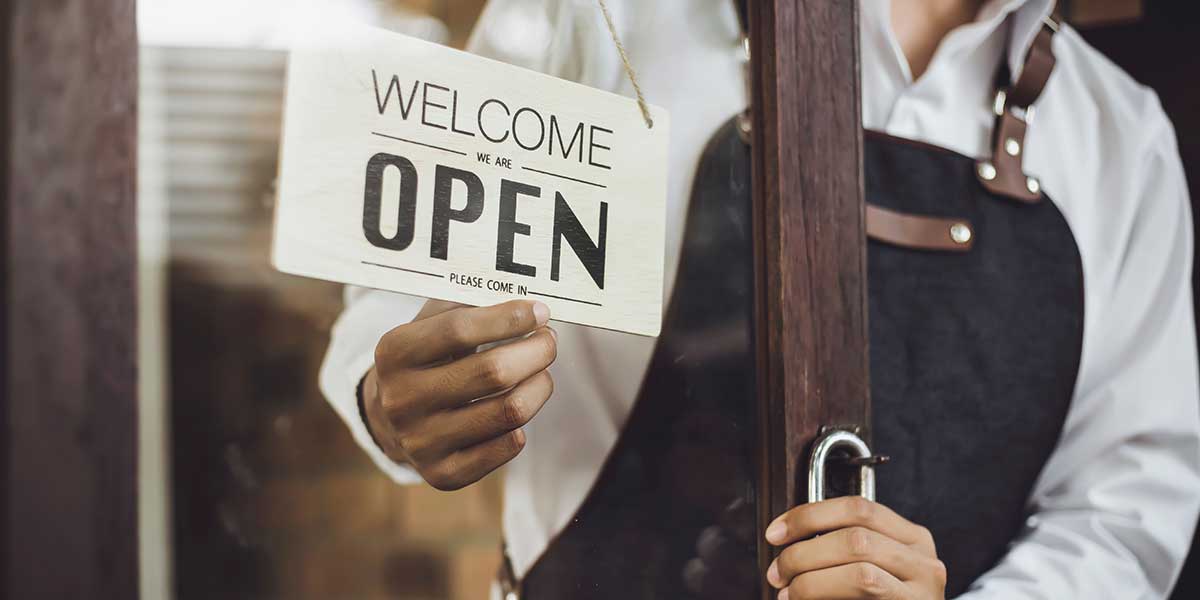Opening a bar starts as an exciting concept. Whether it's a cosy wine bar or an innovative live music cocktail bar, the bar industry has so much scope for new concepts.
It can be scary to turn your idea into an actual business but if you are ready to take the plunge then our checklist is sure to give you the confidence boost.
A 15-Step Checklist for Opening a Bar
1. Decide on your bar concept
When you had the idea of opening a bar, you most likely had the idea of what type of bar you wanted. Now is the time to get really specific on your concept and how you will stand out in the market. A good starting place is to ask, what do you want customers to feel when they walk into your bar and what value will they get?
Some specific bar concepts can include:
- A cosy craft beer bar where guests can pair beers with a limited, homestyle menu. Customers with a love of beer will feel at home here, with a place to appreciate beer like we appreciate wine.
- A signature whisky bar with an innovative lab for guests to mix their own drinks. Customers will feel creative and have fun interacting with the bartenders and learn about whisky.
- An unpretentious pub with cosy armchairs, fireplaces, board games and a wide range of drinks. Customers can relax and unwind here, catch up with friends and feel at home.
- A 'jukebox' style live Jazz bar where customers can request songs and order signature cocktails. Customers can feel in control of the vibe and music, dance to their heart's content and enjoy delicious drinks at the same time.
Being clear on your concept and value will inform every other decision you make when opening a bar.
2. Name your bar
Choosing a name for your bar puts your idea into a reality. The key elements you need to focus on are:
- It is memorable
- Reflects your brand
- It's unique
There are many tools you can use to help with ideation from restaurant name generation tools to ChatGPT.
When you settle on your winning name, be sure to trademark it for full ownership.
3. Identify your Mission, Vision and Values
Your mission statement identifies your full purpose for existing, your vision explains what you see for the future and your values establish how you will run the day to day operations.
Getting clear on all three statements for your bar will establish your brand and what you stand for. Every decision you make in opening a bar and managing the bar will be steered by these statements.
4. Write a Bar Business Plan
A business plan is necessary, even for a small bar, as it will give you the best possible chance for success.
Overall, a thorough business plan covers:
- Executive summary
- Mission statement
- Company description
- Ideal customer experience
- Sample menu
- Location analysis
- Employees
- Marketing strategy
- Financial projections
If you need to secure funding, a business plan is the number one way to show your commitment to the business and the roadmap you believe in. It may also be helpful to have when obtaining proper licences from Governing Bodies as it shows your business will be legitimate and compliant.
5. Secure Finance or Funding
The financial projections in your business plan will establish how much startup costs you will need. It is wise to create a budget and forecast your spend for the whole year for your initial finance or funding.
Determine how much money you will put into your bar and calculate how much you will need from a business loan. Applying for loans may be more successful if you include your business plan, forecasts and own investments.
6. Obtain the Proper Licences
A business licence task may be one of the most uninspiring elements of the checklist but absolutely crucial. Depending on the location you decide on, your bar may require different licences so it is best to seek the advice of a lawyer. In Australia and New Zealand, a bar may require:
- An ABN or NZBN - A number to officially register you as a business.
- An Alcohol Licence - In Australia, you will need a general bar licence and in New Zealand you will need an on-licence to sell alcohol on a premises.
- Food Licence - If you are serving food in your bar, you will need to apply for a food licence depending on your location. In Australia and New Zealand, you will need to apply with your State or local council.
- Gaming Licence - Any gambling machines in your bar will require a gaming licence in both Australia and New Zealand.
- Music Licence - Both New Zealand and Australia require a venue to have a licence from OneMusic in order to play music in a public bar.
7. Buy Insurance
An essential step for any business is to ensure you are covered for any eventuality.
It is mandatory to obtain:
- Workers compensation insurance - If you will have employees in your bar, it is compulsory to buy workers compensation insurance to cover you and your employees against financial hardship if you fall ill or have an accident.
- Public liability insurance - Any business that deals with the public (clients or customers), will require public liability insurance to cover them against any liability loss.
Other insurance policies vary depending on your location and size but you should consider:
- Business interruption insurance - Any event that stops your business from operating may result in a loss of income.
- Property damage - If you own the building your bar is located in, it is wise to cover yourself from any potential damage or loss in future.
- Product liability insurance - Your products (alcohol or food) could cause harm to a customer, even if you have the best business intentions and responsible service. Protect yourself from unexpected liability claims with insurance.
8. Find the Perfect Location
The right location will directly impact the success of your bar. Now that you are clear on your bar concept and mission, you can look at locations to target the right clientele you are aiming for and how you can serve the local community. Be mindful to choose a location with great foot traffic, like the after work crowd, and close by public transport as customers may not be able to drive to and from your location when drinking alcohol.
Try to avoid areas which are always under construction as this will detract from the ambience you try to create.
9. Design a Bar Layout
Once you have secured your location, it is time to start designing the interior area. A bar floor plan will prepare you for success by making the most of the space you have for seating areas, standing areas and bar equipment. The floor plan will ensure efficiency for bar staff working and serving drinks and strengthen your bar experience ideas and how you want the customer to feel.
Think about the following space:
- Bar fridge (whether walk-in or portable)
- Cellar for beer kegs and stock
- Ice bins
- Bar area space to serve beer, mix cocktails or curate wine tastings
- Bar stools
- Seating areas
- Toilets
- Designated smoking areas
- Standing room
- POS System area
- Staff room
- Fire evacuation process
10. Design your Menu
The concept of your bar will weigh heavily on your drink menu decisions. Whether you are serving food, simple drinks or signature cocktails, there are many benefits to designing a menu with care. It is often a potential customer's first impression of your brand and a deciding factor for booking. So be creative, get clear on your product descriptions and maybe even try your hand at illustrations.
11. Find Alcohol Suppliers
Once you have your concept and ideal menu, you will know the type of alcohol supplier you need. If you are specialising in a certain alcohol, like craft beers or gins then looking locally may be your best bet. However, if you have an extensive menu then a large wholesale distributor could be the most cost efficient.
Find an alcohol supplier that fits in with your concept and values and will be able to handle the demand of your forecasted projections. Building great working relationships from the start will put you on "tap for triumph".
12. Buy a Bar Point of Sale System
A bar POS system is essential for any bar in the digital age as customers no longer want to wait for slow processing times. Your POS system should be integrated with a payments processor that accepts any form of payment. Additionally, if you are looking to sell online in future, take reservations and manage reports then it would be wise to invest in a system which can integrate many features together like ResDiary.
ResDiary is a reservation software that integrates inventory management, online orders, menu changes, marketing, POS systems and staff performance tracking so bar owners have more time to concentrate on what matters, your customer bar experience.
13. Set up inventory systems
Inventory systems are essential in managing ongoing costs and efficiency in all business operations. Your potential for profit will depend on the careful planning of inventory, from your initial cost to the weekly top ups. As a bar owner or bar manager, you should automate this process with a full integrated system to track inventory against sales.
ResDiary features allow you to easily run reports and automatically track when stock is low or may need more cost effective decisions in place.
14. Hire Excellent Staff
As a bar owner, you will want to find excellent staff who will see your vision and deliver the excellent customer service you value. The hospitality industry is renowned for having a high turnover of staff, so it is essential to spend time on finding the quality employees from the beginning and capturing them with enthusiasm for your vision and culture.
The amount of staff you need will vary depending on your bar concept and size. For example, a large sports bar may need more casual bartenders but a small and niche wine bar may need a few quality bartenders and sommeliers.
Think about hiring the following roles:
- Bar Manager
- Bartenders
- Waiters
- Chefs
- Dishwasher
- Host/Hostess
- Security
- Sommelier
- Craft beer brewmaster if you are brewing in-house
- Alcohol distiller if you are making craft spirits
Bring all of your employees together ahead of the grand opening to partake in thorough training and team bonding. This will ensure your bar business values are aligned and everyone is clear on the customer experience to deliver.
15. Market your Bar
Now that you are clear on the business structure and you finally have your own bar, it is time to draw in the right customers. Marketing in the digital age is essential and highly competitive. However, the good news is that it is possible to get yourself on many platforms and reach many people.
Consider:
- Building a website - This is the number one way to communicate your brand and concept with potential customers and compete for a place on Google searches.
- Build a Google business profile - If you want to appear on people's Google map searches then build a business profile and fill in every single element of text.
- Promote on social media - One of the most accessible marketing tools you can use are social media platforms like Instagram, Facebook and TikTok. Share photos and reels of your bar, drinks and grand opening.
- Add your business to directories - Online directories are seen as a token of trust in both Google and the customer's eyes. Create a venue listing through ResDiary's integrations with Quandoo and Restaurant Hub. Add your bar to Yelp, Zomato and UrbanSpoon.
Marketing is a continual job for bar owners and managers and there are many ways to be creative and connect with the local community. Consider introducing happy hours, hosting events or collaborating with local blogs and influencers.
Raise the Bar: Elevate Your Business with the Right Tools
Now that you have the ultimate guide to opening a bar, it's time to turn your dreams into a reality. By following this comprehensive checklist, you're well-equipped to navigate the exciting journey of starting your own bar. Remember, success lies in the details—from defining your unique concept to hiring exceptional staff and implementing effective marketing strategies.
As you embark on this thrilling adventure, don't forget the importance of streamlining your operations and providing an exceptional customer experience. That's where ResDiary, the leading booking software platform, comes in.
With its comprehensive features, including reservation management, inventory tracking, and integrated POS systems, ResDiary empowers you to focus on what truly matters: creating memorable moments for your customers.
Book a Demo with ResDiary Today




